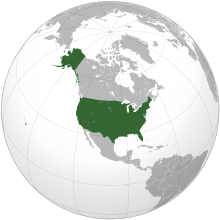When Security Policies Are Based On Fear – OpEd
After 9/11, the US blasted out its harbor seeking retribution against the international terrorist organization known as al Qaeda and the unrecognized Afghanistan Taliban regime. It was soon apparent after this operation commenced that the US government had transformed itself into a climate of fear. This drove the political and social climate at home and fueled the wars abroad that followed.
On the exterior, Americans did not show any weakness to their enemies. President George W. Bush let the military and the intelligence agencies take the lead role in developing and instigating foreign policy as the primary tools of statecraft. America let the enemies see their rage but not their fears.

On the interior, things were not so good. America was compelled to make foreign policy and national security decisions that rested more on the hinges of fear than on the necessary reasoning. Emotions of fright led to self-delusions, illegal detentions and invasions of privacy, Soon came Operation Iraqi Freedom. This was the military operation to secure an entire population of 25 million people based more on fear that Iraq had nuclear weapons “and” was connected to al Qaeda and any other trumped up charges which later appeared more deceptive than legitimate for an invasion of another country that did not directly threaten the USA but was a menace to its people and the region.
Eleven years into the “War on Terror,” the US military and security services have almost entirely destroyed the al Qaeda leadership and infrastructure in Afghanistan and Pakistan, amidst disrupting many cells throughout the world (e.g. Yemen, Somalia, Libya and Sudan). To be sure, they have not eliminated al Qaeda, but al Qaeda was not just a terrorist organization under the leadership Osama bin Laden—it’s teeth lie in its ideology.
Are they gone? At this point, al Qaeda is anyone who joins in jihad and declares themselves al Qaeda, or anyone that a state declares as al Qaeda. The al Qaeda that attacked the US on September 11, 2001, has been eliminated, thanks to the full measure of the American national security agencies, departments and professionals. Any fringe elements of the “movement” that exist are jihadists claiming affiliation to an organization that has lost traction and fallen apart.
New networks have emerged that carry their banner. The US remains in fighting the Taliban insurgency in Afghanistan and Pakistan. The Haqqani terrorist network is also a developing threat as well as Muslim extremists in Pakistan. Al Shabaab in Somalia, al Qaeda in Libya, Yemen, Syria and many others. Most or all of the anti-terrorist or counter-terrorist operations can and should be accomplished quietly, but Pakistan is a bigger nightmare than Iran and yet we have managed to work with the Pakistani government and not the Iranians because we need their “support” to fight terrorists in Afghanistan that are coming from their nuclear weapon state which was hiding Osama bin Laden all along.
Not only is American foreign policy fearful but it is too often foolish and whimsical and far too short sided. Who to fight next? Wasting no time on picking the next enemy the US is still operating in “vengeance” mode and looking like “The Empire Strike’s Back” to the rest of the developing world. Evidence to the American military industry madness that swept the nation can be seen in almost every major action of American foreign policy after Afghanistan.
The US does not constructively engage any conflicts like Syria, Libya, Pakistan, Iran, or the Pacific. They cut back on realistic diplomacy with Iran by making it a pariah and in China by immediately siding with its contenders in the Pacific. It does not matter who they are or that some of the “allies” are well known for human rights atrocities, corruption, drug trafficking or unstable regimes about to fall to a people they have oppressed for decades. It would not side with Iran but it would side with Saudi Arabia?
We seem to always find ourselves in the pickle of supporting the “lesser evils” and in the long run create another enemy out of our new so-called allies. No lessons from Iraq either. The US will strike Iran at Israel’s request within the context of a fear climate. Operations Other Than War can delay but not eliminate a nuclear Iran. Diplomacy and good intelligence operations are the best options present in staying informed, close to the enemy, and influential to their internal decision making-process.
Too many threat assessments are easily transformed into fear assessments by politicians and lobbyists and then sold to the people for support. Enter the modern American security industrial complex where a crisis is treated as a demand and then a product is created to meet the demand based on market rules. Rules which are based on the strategic economic value and public support for a political security measure.
From crisis thinking to control
Militaries grow because of the fear of threat. One side builds more missiles and the other side feels inclined by threat to match. But are those missiles targeted at you or intended for another state? Could there be another way to deal with the threat besides just balancing actions? Fear says, it does not matter but reason says that it does. Fear compels a nation to arm, even if there is no genuine danger. And even when there is legitimate threat, fear is often the primal motive factor involved in a reaction that lacks realistic sophistication and calculation.
The objective of fear is to remain unharmed by fight. There is no flight in the case of a state; although a regime may exit before annihilation. One might think the emotion of fear would be a good thing but it is only good as an indicator that something is terribly wrong. It is never good as a guide to dictate a course of action or a nation’s entire foreign strategy.
If fear could be completely replaced with perfect reason on both sides, then there would be the prevention of arms build-up and the end of all wars. Short of perfection, we are left with minimizing conflict by controlling our fears—making them invisible rather than letting them stir up diplomatic catastrophes and counterproductive operations.
US foreign policy must be about the USA and by that, I mean that it must be about the American people. Secondly, it must be based on nothing short of genius. Policy makers must learn to prevent or detour wars, rather than to cause them or contain them; negotiate and manipulate the obstacles, rather than charge at them with blind might. They must learn the advantage of infiltration rather than occupation and casting influence rather than threats. No more a time than now is it so critical for the US, while in its decline as hegemon, then to master the artistry of diplomacy and intelligence.
The foreign ministries and intelligence services have the biggest responsibilities in the prevention of war between states. Either they are utterly incompetent, focused on the wrong mission, or ordered to suspend their functions prematurely by policy makers and place their efforts around erroneous strategies. Piles of books are written on how difficult it was to “prevent” Osama bin Laden from attacking the USA—in spite of the opportunities to do so—and how easy it was after the “failure” to pursue him with the full resources needed to achieve al Qaeda’s defeat. It is a case of misdirection of proper willpower rather than a lacking of resources.
Unfortunately it’s back to realism as I write. Once the US started that train after 2001, Russia was first to pick up and go for a ride. Then other states like China climbed aboard. Belligerence through strength, nationalism and authoritarianism are becoming fixed international norms again. Only the US and Europe have the power to salvage international law and political global damage control—and those once great liberal powers are slipping away by the minute.
The world is teaming up against the US for a reason. Think fear breading fear and military on military. Think US emotionalism on steroids creating more fires then they will be able to put out. So soon we forget about arming and encouraging Georgia to a military build-up and entrance into NATO which lead to the 2008 Russo-Georgia War.
While the American people are watching bikini basket ball, their leaders are sweating bullets in fear and waving guns around every corner of the globe. And it is no small wonder that America is losing the world to instability when it refuses to lead by right example and ignores its own ideological liberal virtues. Its greatest weapon is its political institution and its infinite imagination.

